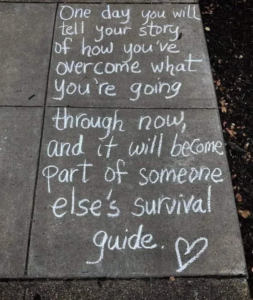 One of the most devastating things about cancer or any chronic disease is the helplessness you feel about your own health. Receiving a cancer diagnosis is devastating. And, it usually comes out of the blue. It has been described as “being dropped behind the lines in a foreign country – without knowledge of the language; without friends, money, or even clothes at times; and having little control over what is happening to you!” We feel as if we are on “red alert” much of the time. It’s exhausting and dispiriting for many people. Some people are able to take it in stride, while others, including myself, experience much distress.
One of the most devastating things about cancer or any chronic disease is the helplessness you feel about your own health. Receiving a cancer diagnosis is devastating. And, it usually comes out of the blue. It has been described as “being dropped behind the lines in a foreign country – without knowledge of the language; without friends, money, or even clothes at times; and having little control over what is happening to you!” We feel as if we are on “red alert” much of the time. It’s exhausting and dispiriting for many people. Some people are able to take it in stride, while others, including myself, experience much distress.
One of the programs offered through Wellspring (an individually funded organization dedicated to providing supportive care programs and services, at no charge, to anyone living with cancer) is called the Healing Journey. The Healing Journey is a program for people who want to learn how to help themselves when they have cancer. It is a practical course, providing simple but proven psychological and spiritual tools which promote inner harmony, peace and healing, methods that can help any of us become a “healed person”.
The main thing they focus on in the Healing Journey is healing from within. In other words, healing through the mind, which means working toward balance and harmony in all aspects of our lives. It’s a way for patients to exercise some control at a time when all external things are very much out of control.
The idea that we might be able to influence the course of a physiological disease by working with the mind is controversial. While there may be some scientific and genetic reasons to explain why cancer occurs in the body, there are many unknowns. Scientists know how cancer may develop, but not why it may develop in some people and not others. What they do know, and I believe wholeheartedly, is that “the mind/brain has an affect on almost everything that happens in the body, especially the immune system. Mental perception of stress can significantly diminish the power of the body to make an immune response which may weaken defenses against certain cancers” (the Healing Journey).
 I believe everything happens for a reason. While I may not discover exactly why I had cancer, I believe there is something I needed to become aware of. My learnings are what I have chosen to share with you in the hopes that you will gain something from my experiences as well. Whether you are (or have been) going through your own health journey, my pathway to growth and learning can apply to everyone. How healthier and happier would we all be if we can learn to influence our mind in a positive way? Writing and sharing my experiences is a way for me to reflect on the meaning of my experience and deepen my learning and hopefully yours as well.
I believe everything happens for a reason. While I may not discover exactly why I had cancer, I believe there is something I needed to become aware of. My learnings are what I have chosen to share with you in the hopes that you will gain something from my experiences as well. Whether you are (or have been) going through your own health journey, my pathway to growth and learning can apply to everyone. How healthier and happier would we all be if we can learn to influence our mind in a positive way? Writing and sharing my experiences is a way for me to reflect on the meaning of my experience and deepen my learning and hopefully yours as well.
We all know that when we are stressed, our body is in “fight or flight” mode. When the stress is removed, our bodies go back to a calm state. However, if we are constantly stressed, anxious, angry, fearful, etc. our bodies are in this constant state of “fight or flight” which makes it harder and harder for our bodies to fight off anything else. Our immune systems are compromised and if this happens all the time, we can get sick. It might be a cold, or the flu or possibly even cancer. Now, I’m not saying that if you have a stressful life you are going to end up with cancer, but if you don’t learn how to manage your stress, cancer, as well as other diseases, can be a possible outcome.
The Healing Journey Program is aptly named as dealing with cancer is definitely a journey. In my case, I was very lucky. They were able to “catch” the cancer very early – Stage 1A, which means my prognosis is very positive in that the cancer will not return. However, to think that my journey with cancer is over would be a huge mistake, and maybe even a guarantee that the cancer may return. In fact, my journey is just beginning. It’s a journey within myself; a journey of self-understanding.
My Breakdown to Breakthrough
As a coach, and someone who focuses on self-awareness, I find it ironic that I really didn’t know as much about myself as I thought I did. What I am learning now has caused me to look deeper within, get to know the real me – my thoughts, how I think, and my emotions. That starts with looking honestly at myself and my situation, being truthful and realistic and understanding what I need to do to help myself.
Too many times, especially people with cancer, only look at the obvious ways to become healthier. This usually means diet and exercise. And while these two things are important for living a healthy, balanced life, looking at, and only focusing on, the body is not a total approach to healthy, balanced living. Stress management is an area that must not be ignored.
Stress and stressful situations or events are different. External events such as being stuck in traffic when late for a meeting can cause us to be stressed or agitated, even upset and angry. Receiving a diagnosis of cancer is an extreme external stress. These things we perceive to be stressful are called stressors. Stress, on the other hand, is the reaction of our minds and bodies to the things going on around us.
Understanding how you respond to stress is critical for making healthier changes. In my recent reading of The Leader Who Had No Title by Robin Sharma, the author suggests that “past ways of being need to be destroyed and released before new and better ways of thinking and behaving can appear… breakthroughs into all the good things waiting for us can’t happen without breakdowns of all the old structures that are limiting us.”
My breakdown was having cancer. Unfortunately, without this event, I probably would not be making the changes I am today. My Breakthrough is learning how to manage stress better.
Here are some ways the Healing Journey suggests to handle stress.
- Reduce exposure to external stresses – if you know certain situations cause you stress, make a conscious choice to change or avoid those situations. Of course, this isn’t always possible but if so, do it.
- Change the labels you apply to stressful events – the mind tends to label stress-inducing events that seem difficult to cope with. In order for you to change this label, you need to pay attention to how you are “editorializing” these comments in your mind. Reframing is a way to change how you think and react to situations.
- Reduce your reaction to the stress – as soon as something happens, our minds react. If we assume the labelled event to be scary or unwanted, on a deeper level, the mind reacts emotionally (with fear, as an example) and enters a fight or flight response. Quieting the mind can help to reduce or eliminate this reaction.
- Relax the body and/or mind – immediately following the reaction of the mind, the body is affected. Muscles will tense up, your heart may start to pound, your stomach can get upset, you may be irritable, can’t sleep well, get headaches, etc. Notice what symptoms occur for you. Learning relaxation techniques such as meditation can help to quiet the mind and reduce the physical symptoms of stress. The simple act of paying attention to the breath is the most effective way to induce relaxation.
It’s important to note that watching TV, gardening, texting or being on social media are not forms of relaxation. You may find these activities enjoyable but your mind is still “engaged”. Meditation is the only way to completely relax the mind while in an awake state. Learning to relax deliberately is the basic technique for healing through the mind.
The next time you experience a stressful event, notice how your mind and body respond. What do you think about? What labels do you apply? What emotion and physical response(s) occurs? Without understanding what currently happens, you cannot understand what needs to change. I challenge (and urge) you to become more self aware in how you handle stress. Your health could depend on it.
Until next time.
